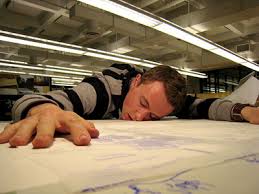 “Sleep, the gentlest of the gods, the spirit’s peace, whom care flies from: who soothes the body wearied with toil, and readies it for fresh labors.”
“Sleep, the gentlest of the gods, the spirit’s peace, whom care flies from: who soothes the body wearied with toil, and readies it for fresh labors.”
That’s how the Roman poet Ovid described sleep in his first century CE masterpiece the Metamorphoses.
Many people today desperately seek the restorative blessings of sleep just as Ovid described, but instead they find themselves plagued by bad dreams about work. Rather than providing a peaceful respite from the burdens of waking life, sleep for many people has become a battleground of job-related stress and financial anxiety. In a recent online survey I conducted with Harris Interactive, 2252 American adults were asked to describe a dream relating to their work or employment status. All the reports are available via the Sleep and Dream Database (SDDb) website. (Here’s a link to the reports of 10+ words in length.) These dreams offer a fascinating window into the workplace experiences of people across a wide demographic swath of American society.
Reading through the dream reports, it becomes clear that each job or profession has its own distinctive type of nightmare:
A trucker dreamed of a car cutting him off, so he had to slam on the brakes and then fight to control his rig as it started to jack-knife.
A nurse dreamed of her patients unhooking themselves from their monitoring equipment and wandering off, which led to the nurse getting fired for incompetence.
A waiter dreamed about having too many customers to serve, forgetting where the tableware was, and losing track of all the orders.
An electrician had vivid recurrent dreams about needing to fix strange gadgets with hundreds of wires, none of them labeled.
Several teachers had bad dreams about being unprepared for class, dealing with uncooperative students, and struggling with new technologies.
Numerous office administrators had nightmares of phones not working, desks piling up with unfinished work, and calculators streaming out endless amounts of rolled paper.
Whatever makes people feel powerless, overwhelmed, or out of control in their particular type of work, that’s going to drive the content and emotions of their dreams.
Sometimes people’s anxieties are transformed by the dreaming imagination into bizarre scenes that reflect a kind of surrealistic commentary on their employment situation. Ovid would surely be delighted by metamorphic dreams like these:
A 30-year old woman from Arizona dreamed that “giant staplers were chasing me down the hall” at the school where she works.
A 35-year old software developer from Minnesota dreamed of going to apply for a job and finding the interviewer was an alien with green skin and a large almond-shaped head.
A 62-year old woman from Illinois dreamed that a computer was chasing her yelling “Program me!”
A 64-year old man from Minnesota who recently lost his job dreamed he had gone back to his office, but instead of the familiar building it was a strange storehouse for used furniture: “I think the dream meant that my former job was basically warehousing people who needed to move on.”
Weird and troubling as these dreams may be, they in fact make perfect sense in light of scientific research showing that dream content tends to accurately reflect people’s waking life emotional concerns. Anything that worries us in waking life will likely show up in our dreams, either literally or metaphorically. This idea of meaningful continuities between dream content and waking life concerns has a lot of data to support it, much of it generated by G. William Domhoff and available on his dreamresearch.net website.
For many people today, worries about their jobs and personal finances top their list of emotional concerns in waking life. Several of the survey participants spoke of their fears about losing their jobs or trying to find a new one. A 27-year old Arizona man who has recurrent nightmares of being attacked by bears said, “You never know if you will have employment the next day.” In such a tenuous economic environment, dream content will naturally reflect people’s job-related worries and preoccupations.
There seems to be a rough evolutionary logic to these kinds of bad dreams. Several researchers, most recently Antii Revonsuo and Katja Valli, have proposed that one of the functions of dreaming is to simulate possible threats in the waking world, helping to prepare the individual to better handle those threats if they ever actually occur. In this view nightmares give us a safe opportunity to mentally practice survival-related behaviors and get ready for potential dangers. The short-term pain of upsetting dreams is outweighed by their long-term gain in promoting greater vigilance and preparedness.
It should also be noted the same powers of imagination that generate vivid work nightmares can also generate many other kinds of dreams as well. Here too there is good scientific evidence to support the idea that dreaming is an inherently creative and multidimensional activity. During rapid eye movement (REM) sleep, the time of the sleep cycle when most dreaming occurs, the brain becomes hyper-associative. The constraints of externally focused consciousness loosen, allowing innovative possibilities to emerge out of wide-ranging connections between perceptions, memories, instincts, and cultural influences. This is why dreaming seems so crazy and scattered—and why it’s occasionally the source of brilliant flashes of creative insight.
If you have recurrent nightmares about work, try this: After getting in bed each night and turning off the light, take a moment to think about the amazing creative powers in your own dreaming imagination. If your dreams can create vividly realistic scenarios of work, what other kinds of scenarios could they create? What are the strangest, most otherworldly dreams you’ve experienced in the past? What would you like to dream about now?
Your dreams may feel like foes, but with an open mind and playful spirit you can persuade them to become allies.

